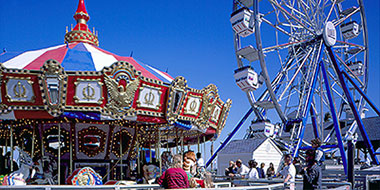1. Use Present Continuous for Arrangements
| Mary | Are you going anywhere this weekend? |
| Tom | Yes, I‘m going to the amusement park. My family are visiting there. I bought my ticket yesterday. |
We use the Present Continuous for what someone has arranged to do in the future. In this example, Tom has arranged to go to the amusement park. (He has bought the ticket). See more examples:
- Peter is riding to work later on.
- I‘m meeting with Nick at 9am.
- Mary is going to London next Sunday.
- We‘re having a party at weekend.
We also use the Present Continuous Tense to talk about things happening now.
Present: We are meeting with Nick at the moment.
Future: We are meeting with Nick at weekend.
Here are the phrases of time shows whether we mean the present or the future. But sometimes there is no phrase of time, as when Tom says “My family are visiting there.” Here it is clear from Mary’s question is that the conversation is about a future event.
The Present Continuous Tense for the future and be going to have similar meanings.
- We are meeting with Nick next week. (We have made the arrangements.)
- We‘re going to meet with Nick next week. (We intent/have decided to have one)
Normally, we can use either form.
- We are meeting/are going to meet with Nick next week.
Present Simple for a Time Table
- A. What time does the flight start this evening.
- B. Eight o’clock in the evening. It gets to London at ten o’clock.
The Present Simple is used for the Future when we are talking about a timetable, usually a public timetable such as airplane, bus or train timetable.
- The football match starts at 7.00pm.
- Next Sunday is the May Day.
- The train leaves at six in the evening.
- She’s got the program details here. We stay all day in town.
Compare the Present Tense for repeated actions
- The train leaves at six every evening.
Be to and Be about to
We use be to for a future event that is officially arranged. It is often used in new reports.
- The King is to visit France in October.
- The Olympic Games are to take place in Paris next month.
We could also use the Present Continuous here.
- The King is visiting France in October.
We use be about to for the very near future.
- The bus driver starts the engine. It is about to leave.
- Do you want to welcome our guests. They‘re about to come.
